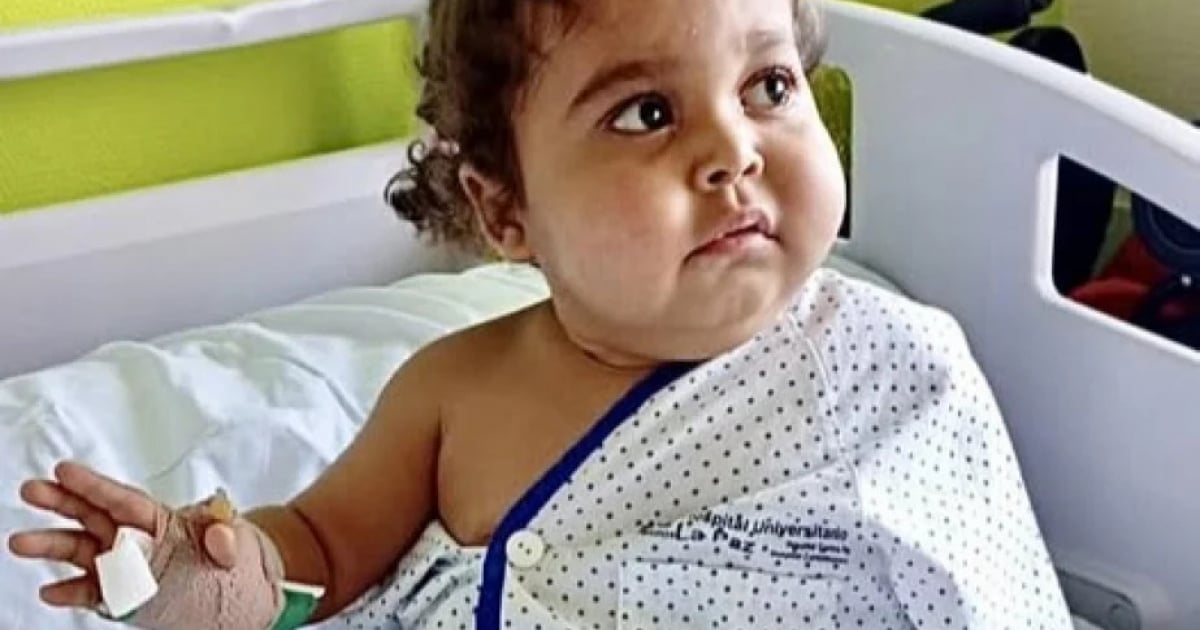
Related videos:
The Cuban girl Amanda Lemus Ortiz, who underwent a liver transplant in Spain last March, has had to be hospitalized again.
Activist Yamilka Lafita (Lara Crofs) reported this Friday that the young girl had to return to the hospital on November 27.
According to Lara, Amanda had been experiencing itching for days, which even caused her problems while sleeping. When taken to the doctor, an emergency ultrasound was performed and it was detected that her bile duct was dilating once again.
"She is being prepared to enter the hospital on the afternoon of November 27, so that the next day a stent can be placed in the dilated duct for it to function properly. Since they cannot proceed because the duct is too narrow, they decide to place a drain to expel the bile from her body, and after a week, they will attempt to re-enter the duct," he detailed on his Facebook wall.
"Today was the third attempt; they still can't place the stent. The doctors decided to proceed with surgery to try to recondition that pathway and insert the stent, because without it, there is a risk of relapse which could once again affect the healthy liver," she added.
The activist urged her followers to pray for the young girl to support her in this new difficult challenge she must face.
"The surgery is scheduled for Monday morning," he/she specified.
Hundreds of people commented on the post wishing the girl a speedy recovery.
At the beginning of November, seven months after Amanda's transplant in Madrid, following the Cuban health system's abandonment of her, Lara shared a photograph showcasing the remarkable progress of the little girl.
"Do you recognize that little face? To me, it represents willpower, the idea that 'where there's a will, there's a way,' and the unity of a civil society that rose up for a greater and nobler cause," she said on her Facebook profile.
The struggle to save Amanda's life began in January when her mother, in a message that went viral, publicly apologized to her daughter for bringing her into a country that could not meet her medical needs.
Amanda was suffering from a severe liver disease and urgently needed a liver transplant, but the limitations in Cuba prevented her from undergoing the surgery, so a humanitarian visa was requested for her.
After several weeks of campaigning supported by activists, independent media, and generous Cubans, the necessary funds were raised for Amanda and her parents to travel to Spain, where a hospital had agreed to take her case.
At the end of September, she was already eating a lot and was very active.
"She can now sit on her own, although she still has her orthopedic chair, and she is slowly starting to babble some words (she is being attended to by a speech therapist) and undergoing physical therapy; she is already taking a few steps," Lara Crofs explained at the time.
The activist explained that the minor needed to go to the hospital regularly for check-ups and that the Spanish doctors were very pleased.
"Mila tells me that she is very hyperactive and always laughing, she's happy. She can already sit up by herself, eats really well, and if everything continues as it is, she might start walking next year," Laffita specified in a post shared in August.
"Amanda was the girl who restored hope for many Cubans inside and outside of Cuba. The solidarity and support that this family received was truly moving and incredibly beautiful. The life of this little one was a cry from Cuban civil society, united in a single voice, beyond ideologies, beliefs, and race," she stated.
Frequently Asked Questions about the Health and Recovery of Amanda Lemus Ortiz
Why was Amanda Lemus Ortiz readmitted to the hospital in Spain?
Amanda Lemus Ortiz was readmitted to the hospital due to issues with her bile duct, which was dilating and causing discomfort such as itching. The doctors attempted to place a stent to address the problem, but upon finding that the duct was too narrow, they opted to proceed with surgery.
How has Amanda's recovery process been following her liver transplant in Spain?
Amanda's recovery process has been complicated but progressive. Following her liver transplant in March 2024, Amanda has shown significant improvement, although she has faced setbacks and complications. Over the months, she has achieved important milestones in her recovery, such as the removal of IV drips and catheters, and she is now able to sit up on her own and babble a few words.
What challenges did Amanda face in Cuba before being moved to Spain?
Amanda faced serious limitations in Cuba due to the lack of medical resources needed for the urgently required liver transplant. Her health deteriorated significantly as she did not receive the necessary treatment, leaving her practically abandoned by the Cuban healthcare system. This prompted an international campaign to raise funds and facilitate her transfer to Spain, where she was finally able to receive the proper care.
How has international solidarity influenced Amanda's case?
International solidarity has been crucial in saving Amanda's life. Thanks to donations and the support of activists and the Cuban community abroad, funding was secured for Amanda's treatment in Spain. This mobilization demonstrated the power of civil unity and the importance of international aid in overcoming the shortcomings of the Cuban healthcare system in critical cases.
What role has Amanda's family played in her recovery?
Amanda's family has been essential in her recovery process. Emmanuel Lemus, Amanda's father, donated a portion of his liver for the transplant and has been alongside his wife, Mila, supporting their daughter at every stage of her treatment in Spain. Their dedication and sacrifice have been a constant presence in the fight for Amanda's health.
Filed under: